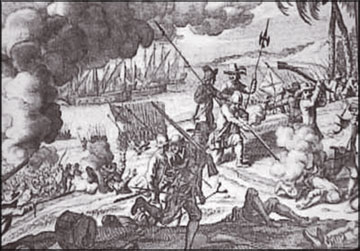Some social changes from Portuguese contact
Andrew Scott
Many social changes took place in Sri Lanka due to the contact with
the Portuguese who arrived in these shores in about 1505. Particularly
in the sphere of language we see that a large number of Portuguese words
were borrowed by the Sinhala and Tamil languages. As Fr. Perera the
great Sri Lankan historian mentioned: “Practically everything introduced
by the Portuguese is still denoted in Sinhalese by a word borrowed from
that language (Portuguese).”
At the inception a large number of Portuguese proper names were
readily adopted by many people in Sri Lanka. Names such as Dias, Andradi,
Abrew, Aponso, Cabraal, Caldera, Costa, Fonseka, Livera, Perera and
Pinto have stuck to some Sri Lankan families for several generations and
they are preferred names even today.
Most of the words borrowed from the Portuguese have seeped into the
native language and are very much in use even now. Some of these common
words include pinturaya and janelaya. Some articles of daily use
introduced to Sri Lanka by the Portuguese are still designated by
Portuguese words. The following are some interesting examples that
clearly show the cultural impact of the Portuguese on the Sri Lankan
society. In this random list the Sinhala word is followed by the
Portuguese word and then by the English word. Viscotu, viscoittu,
biscuit; pan, pao, bread; accharu, achar, pickle; vinakiri, vinagre,
vinegar; bottam, botao, button; citta, chita, chintz; karabu, cravo,
earring; lensu, lenco, handkerchief; renda, renda, lace; kamisa, camisa,
shirt; sapattu, sapato, shoes; saya, saia, skirt; pippa, pipa, barrel;
botale, botelha, bottle; baldi, balde, bucket; koppa, copo, cup; pigana,
pingan, plate; pirisi, pires, saucer; bandesi, bandeja, tray; almari,
armario, almirah; banku, banco, bench; lampu, lampada, lamp; lantaruma,
lanterna, langern; mesa, mesa, table; pipinna, pepino, cucumber; pera,
pera, guava; papol, papaia, papaw; annasi, ananas, pineapple; batala,
batatas, sweet potato.

Native languages
From the above list of Portuguese words currently being used in Sri
Lanka, we can see how much the Portuguese have influenced the Sri Lankan
cultural scene. At that time not only the Portuguese language but the
ways and manners and the use of articles introduced to this country by
the Portuguese became a status symbol, specially in the elitist society
of a bygone era.
In addition to the impact on the native languages the Portuguese,
particularly through the medium of Christianity, brought about a
significant social change in the manners and customs of the Sri Lankans.
For instance, following the example of the Portuguese, the Christian
converts took up to meat eating. It is seen that even today meat eating
is usually more popular in the predominantly Christian parts of the
country.
It is well-known that the caste system came to Sri Lanka with the
Aryan immigrants and got rooted here. In ancient Sri Lanka a member of
one caste could not adopt the occupation of another and according to the
great historian P. E. Peiris (Ceylon and the Portuguese) “Each caste
among the soldiery would be grouped separately, and no one of a low
caste could take command over a man of a higher caste.”
Caste determined even the kind of dress or amount of clothing one
should wear.
Thus the caste system was deeply embedded in the social life of the
Sri Lankans at the time the Portuguese arrived in Sri Lanka. But the
Portuguese paid no respect to the caste system and they always
encouraged free social intercourse which brought about a very
significant social change in this country.
Western medicines
Also with the advent of the Portuguese many changes took place in the
traditional attitudes, customs and practices relating to marriage, sex
and family life in Sri Lanka.
The Portuguese and their Christian missionaries discouraged polygamy,
polyandry, group marriages and cross marriages. The Portuguese and their
religion brought about a significant change in the attitude to beliefs
and practices connected with supernatural powers.
It was in the Portuguese period that the Sri Lankans first came into
contact with Western medicines and the Western way of treating diseases.
However, from the very ancient times the Ayurvedic system of medicine
was popularly practised in Sri Lanka from the time of the ancient
Sinhala kings.
Though there were organized hospitals and surgeries during the time
of the ancient kings of Anuradhapura and Polonnaruwa when the Portuguese
first arrived in Sri Lanka this country did not have hospitals and
organized systems of treating patients.
Social graces, such as, the organising of parties and picnics came
along with the advent of the Portuguese. At the same time the great vice
of consuming alcoholic drinks spread far and wide with the arrival of
the Portuguese. The other new things they introduced to Sri Lanka were
the Portuguese songs and their ever popular bailas, remnants of which
are still extant in a few places in Sri Lanka. |



